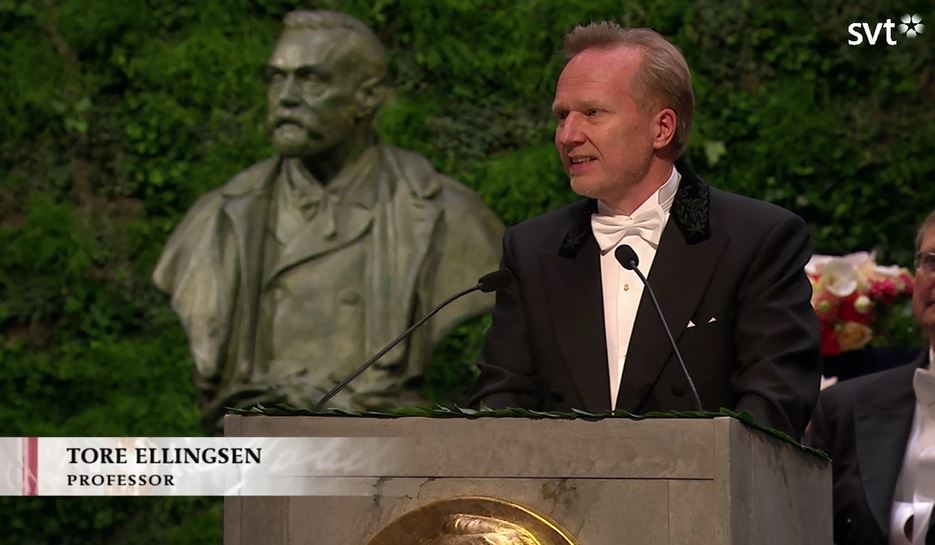Professor Tore Ellingsen's speech to the Nobel Laureate

Tore Ellingsen's speech:
Your Majesties, Your Royal Highnesses, Esteemed Laureates, Ladies and Gentlemen,
“Someone who is very strong has to be very nice also.”
This is what Swedish children’s author Astrid Lindgren says about the title character in her 1947 book Do You Know Pippi Longstocking? Pippi has caught two thieves and made them cry, but as a farewell present she gives them each a gold coin to buy food.
Astrid Lindgren was hopeful and visionary, but not naïve. She saw that not all those with power are good or even responsible. In her 1954 book Mio, my Son, the evil Sir Kato has a heart of stone – and only a sword that has been forged for thousands of years can penetrate a heart of stone.
What, then, is the magic sword that can cut through stone? This sword is a law that creates prosperity and justice.
At one time, the law of the strong prevailed – the ruler’s word was law. But eventually, in country after country, the decrees and whims of the sovereign have given way to parliamentary laws and voluntary contracts. The sword is ours to lift together. When political power is open to democratic competition, we act together to monitor and replace governments. Even when cooperation is less than perfect, as in Sweden during recent months, our common sword performs its magic feats without spilling a drop of blood. But what about economic power? Who monitors and replaces the owner of a company? Often, the answer is that no sword is needed. Even a baker with a heart of stone sells good bread at reasonable prices, because if the bread tastes bad or is too expensive, the baker will have no customers.
But in markets without room for more than one or a few companies, customers have nowhere else to go. There a sword is needed. Most countries have public authorities that regulate transport, postal and telecom companies, water companies, power grids and banks. They also have authorities that monitor large companies – even in the bakery trade – to make sure they do not abuse their power. They must not prevent new bakeries, with better recipes, from entering the marketplace.
How shall we encourage powerful companies to act in the best interest of society? A good regulatory system should balance many objectives. On the one hand, we want to reward good performance – on the other hand, we do not want to spend tax money unnecessarily. On the one hand, we want to tax excess profits – on the other hand, we do not want to wipe out profits that will enable a company to survive. On the one hand we want well-run, productive companies to grow large – on the other hand, we do not want old companies that were yesterday’s best to stand in the way of new companies that will be tomorrow’s best.
For generations, we have pondered these issues and failed to resolve them.
Jean Tirole realised that we needed new tools to find the answers. With the help of game theory, he has shown how we can understand behaviour in markets with a few players – how the decisions of companies depend on their opportunities to improve efficiency, their information and their opportunities to sign binding contracts.
He has shown how we should curb natural monopolies when the regulator has less information than the company. He has shown how regulators themselves can become players and how rules should constrain them as well. He has shown how competition laws should reflect the peculiarities of each individual industry – from banking to telecommunications, search engines and social networking services.
Dear Professor Tirole. Once upon a time, we sought a magic sword that would cut through any stone. Then, one day a new blacksmith arrived. He forged many swords, each of them stronger and more flexible than any we had seen before, and he showed us which sword cut which sort of stone. Finally, on each sword, he engraved Voltaire’s commandment: Un grand pouvoir impose une lourde responsabilité (With great power comes great responsibility).
You are that blacksmith.
It is an honour and a privilege for me to convey to you, on behalf of the Royal Swedish Academy of Sciences, our warmest congratulations. May I now ask you to please step forward and receive your prize from the hands of His Majesty the King.



